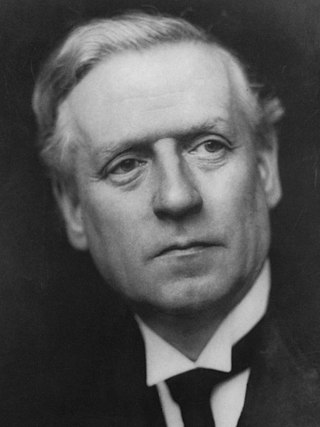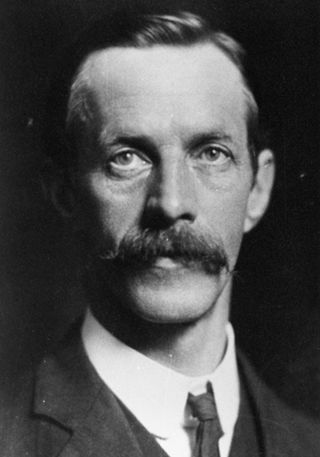The Protectionist Party, also known as the Protectionist Liberal Party or Liberal Protectionist Party, was an Australian political party, formally organised from 1887 until 1909, with policies centred on protectionism. The party advocated protective tariffs, arguing it would allow Australian industry to grow and provide employment. It had its greatest strength in Victoria and in the rural areas of New South Wales. Its most prominent leaders were Sir Edmund Barton and Alfred Deakin, who were the first and second prime ministers of Australia.

The December 1910 United Kingdom general election was held from 3 to 19 December. It was the last general election to be held over several days and the last to be held before the First World War.
The Liberal Party was a parliamentary party in Australian federal politics between 1909 and 1917. The party was founded under Alfred Deakin's leadership as a merger of the Protectionist Party and Anti-Socialist Party, an event known as the Fusion.

The 1909 Alberta general election was the second general election held in the Province of Alberta, Canada. It took place on March 22, 1909, to elect 41 members to the 2nd Alberta Legislature. The incumbent Liberal Party led by Premier Alexander C. Rutherford achieved a re-election victory, securing a majority government by winning 36 out of the 41 seats in the legislature with more than 59 percent of the popular vote. The Conservative Party led by Albert Robertson once again formed the official opposition, with only two members, and Robertson himself was defeated in his own seat in High River. The remaining three seats were divided among smaller parties and independent candidates.

The 1908 New Zealand general election was held on Tuesday, 17 and 24 November and 1 December in the general electorates, and on Wednesday, 2 December in the Māori electorates to elect a total of 80 MPs to the 17th session of the New Zealand Parliament. A total number of 537,003 (79.8%) voters turned out to vote.

The 1910 Australian federal election was held in Australia on 13 April 1910. All 75 seats in the House of Representatives, and 18 of the 36 seats in the Senate were up for election. The incumbent Liberal Party led by Prime Minister Alfred Deakin was defeated by the opposition Australian Labor Party (ALP) led by Andrew Fisher.
This is a list of members of the 18th Legislative Assembly of Queensland from 1909 to 1912, as elected at the 1909 state election held on 2 October 1909.
The 1912 Edinburgh East by-election was a Parliamentary by-election held on 2 February 1912. The constituency returned one Member of Parliament (MP) to the House of Commons of the United Kingdom, elected by the first past the post voting system.

The 1909 Bermondsey by-election was a by-election held on 28 October 1909 for the British House of Commons constituency of Bermondsey in South East London. It returned one Member of Parliament (MP) to the House of Commons of the United Kingdom, elected by the first past the post voting system. Two suffragettes who tried to disrupt the men's election damaged the presiding officer and the ballots.
The Mid Derbyshire by-election was a Parliamentary by-election held on 15 July 1909. The constituency returned one Member of Parliament (MP) to the House of Commons of the United Kingdom, elected by the first past the post voting system.
The High Peak by-election was a Parliamentary by-election held on 22 July 1909. The constituency returned one Member of Parliament (MP) to the House of Commons of the United Kingdom, elected by the first past the post voting system.
The 1909 Dumfries Burghs by-election was a Parliamentary by-election held on 20 July 1909. The constituency returned one Member of Parliament (MP) to the House of Commons of the United Kingdom, elected by the first past the post voting system.
The 1909 Edinburgh East by-election was a Parliamentary by-election held on 16 April 1909. The constituency returned one Member of Parliament (MP) to the House of Commons of the United Kingdom, elected by the first past the post voting system.
The 1909 Glasgow Central by-election was a Parliamentary by-election held on 2 March 1909. The constituency returned one Member of Parliament (MP) to the House of Commons of the United Kingdom, elected by the first past the post voting system.
The 1909 Edinburgh West by-election was held on 17 May 1909. The by-election was held due to the resignation of the incumbent Liberal Unionist MP, Lewis McIver. It was won by the Liberal Unionist candidate James Avon Clyde, who was unopposed.
The 1909 Stratford-on-Avon by-election was held on 4 May 1909. The by-election was held due to the incumbent Liberal MP, Thomas Kincaid-Smith, resigning to restand following his resignation from the Liberal Party. It was won by the Conservative candidate Philip Staveley Foster.

The 1909 Hawick Burghs by-election was held on 5 March 1909. The by-election was held due to the resignation of the incumbent Liberal MP, Thomas Shaw. It was won by the Liberal candidate John Barran.
The 1909 Edinburgh South by-election was held on 4 March 1909. The by-election was held due to the incumbent Liberal MP, Arthur Dewar, being appointed Solicitor General for Scotland. It was retained by Dewar.
The 1907 Jarrow by-election was held on 4 July 1907.






